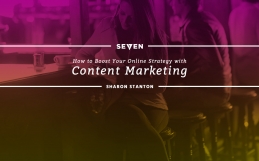How do you build a successful marketing strategy? Which pieces of the puzzle are the most important? The answers will vary depending on your business. (For example – some organizations benefit from extensive print collateral, others only need business cards.) But there are elements that are necessary for all businesses.
Before you develop the pieces of your marketing campaign, you must understand:
- What makes your business fundamentally different from your competition? Why should someone do business with you? (Not what do you offer, but why are you the best one for the job?)
- Who is your customer? As with any relationship, understanding your customer means understanding them on an ongoing basis. You need to continually pay attention to trends, market changes, and current events, and how they affect your customer.
Okay! Now that you’ve answered those easy questions, here are what we feel are the most important pieces of a successful total marketing strategy:
Branding strategy. This ties all the elements of your marketing strategy together, and it’s more than a logo and a tagline. Ideally it should include a vision and mission statement. (Pro tip: Vision statements defines a business’ goals for the future, and mission statements define the present purpose of an organization as well as the who, what, and how.) What you develop here will steer every other piece of the puzzle. What is your brand’s personality and voice? This affects how you engage clients, develop content, and interact on social media – it’s the face of your company.
Mobile-friendly website. Your website must be the hub of your marketing activity, and mobile-friendly is no longer optional.
Social media strategy. Depending on your business, your strategy can include any combination of following: Facebook, Instagram, Twitter, LinkedIn, Pinterest, and Google+. However, it is not enough to just “be on social media.” You must have a plan and calendar in place for what to post, when to post, and how to engage with your audience.
SEO and SEM strategies. It doesn’t matter how great your website is if no one can find you.
Content marketing. This may include, among other things, a regularly updated blog or email campaigns that are not all about a sales pitch (such as a newsletter format). Real life scenario: An attorney client of ours sends out an e-blast every other week focusing on legal topics that may be of interest to her clients. Through our tracking software we are able to see that her recipients find these emails valuable – they open them, click links and share them with their networks. This client gets regular referrals directly as a result of this content marketing strategy.
“Elevator pitch.” (Industry jargon is a pet peeve of mine, but I can’t think of a better way to describe this.) Your elevator pitch is a brief, clear description of how you do what you do differently (read: better) than your competition. Everyone in your company needs to be able to deliver this in an effective manner.
Marketing automation. I am including this because it is so important; however, it needs to come later, once you have a solid foundation in place. Marketing automation does not replace taking care of people personally, it just makes it easier to track and evaluate how your overall campaign is doing.
Anything you’d add to this list? Speak up in the comments!




